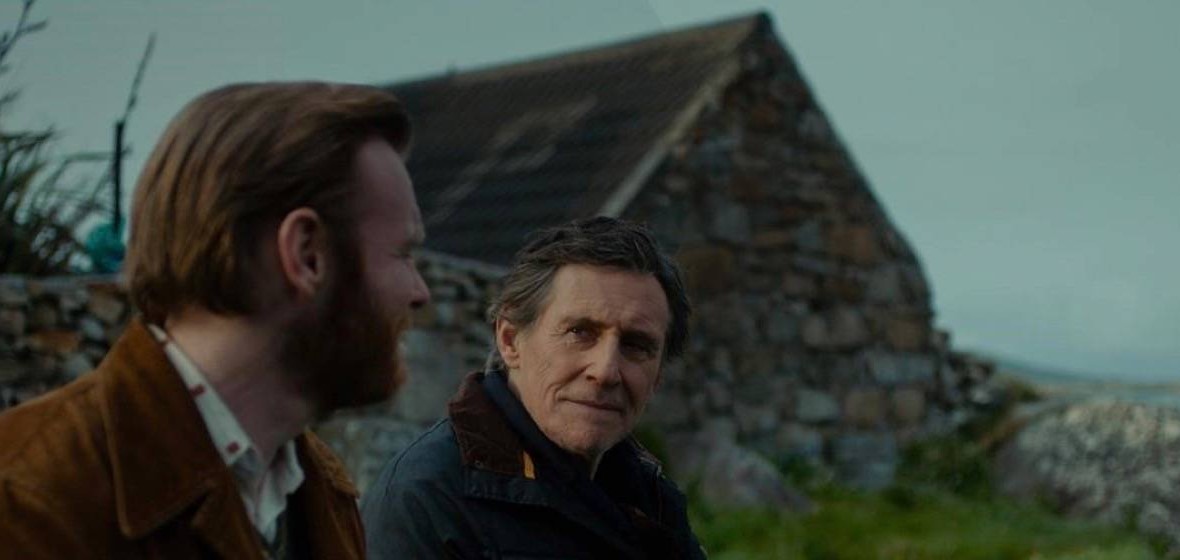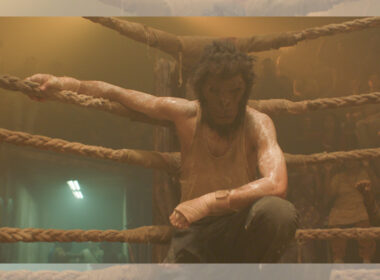Rating: ***
Enjoyment of Death of a Ladies’ Man is directly related to how much you care for the work of Leonard Cohen. And if you don’t care about the Canadian troubadour, I don’t know what to tell you. The singer/poet is the bastion of a forgotten perception of masculinity: fragile, emotional and soulful. So, in a way, your enjoyment of Death of a Ladies’ Man is directly related to having a soul.
Framed around a selection of Cohen’s classic songs, this Irish/Canadian production follows sulky ageing university professor Samuel (Gabriel Byrne). He faces his mortality and the tangled threads of his life. At the start, he catches his wife in bed with another man, which devolves into a surprisingly earnest conversation; “how many people did you sleep with in our bed?” she asks a speechless Samuel.
Divorce is on the cards, but because misfortunes never come singly, he’s also dying of brain cancer. In these crossroads, Samuel looks at what he missed in his life and becomes the tragic protagonist in Cohen’s song – a flawed man healing from self-destructive features of his past. Plagued by strange hallucinations and the ghost of his dead father (Brian Gleeson), Sam expectedly makes amends with his ex-wife Geneviéve (Suzanne Clément) and reconnect with his son Layton (Antoine Olivier Pilon) and daughter Josée (Karelle Tremblay).
Most of the cast is a who’s who of French-Canadian cinema who deliver on the pedigree they represent, especially Clément and Pilon, who had joined forces last in Xavier Dolan’s masterpiece Mommy. Their roles here are humbler but no less compelling, like in the scene where Pilon’s gay hockey player enacts a pitch-perfect brother/sister dynamic as the politically illiterate jock-brother working to irritate his militant feminist sister; illustrating the life Samuel missed out on.
The beating heart of the film is Byrne though. Perfectly sulky, brooding his way through Montreal with a glass of whisky, constant sorrow filling his eyes. He is what the last three Cohen albums sound like. There isn’t much to learn about Samuel’s past, but it’s easy to fill in the gaps with Byrne’s delivery: a bohemian academic and womaniser who caused grief to his partners due to the unavoidable nature of himself. Alcoholic, broken but not necessarily toxic.
Writer/director Matt Bissonnette fails to take full advantage of the talent at his disposal. Some of the ideas work without much fuss, but for every burst of creativity there are two choices that either don’t fit or fail to live up to expectation. A case in point is Samuel’s hallucinations, like the Canadian-national anthem replaced by Cohen’s contemplative “Bird on the Wire” while two teams of ice-hockey players slide like dancers in a beautiful moment of magical realism Canadian-ness. On the other hand, a gaggle of flying giant geese shooting fire over Montreal as a fairy appears – like Sheryl Lee in Wild at Heart – feels like a remnant from another, vastly more uninteresting film.
The choice of songs is why we are here. In some of his previous films, Bissonette, who referenced Cohen, understands and pays respect to the words without trying to shove an in-your-face concept similar to what Julie Taymor did in the excruciating Across the Universe. There are no characters named Suzanne or Marianne, and Samuel doesn’t reference going from Manhattan to Berlin. Instead, he effectively channels Cohen’s torment and how it affects others. Samuel’s relationship with his daughter and how it ends up influencing her psychological profile could have been taken directly from a Cohen ballad.
One nitpick: I wish the film avoided the inclusion of “Hallelujah”. Cohen’s song, made famous by Jeff Buckley’s cover of John Cale’s cover, is a tune Cohen himself worked to perfection to no avail until it reached the mainstream. Even then, in one of his later interviews, he asked filmmakers to stop using it.
There are so many other Cohen songs that would’ve fit this project better. Anything from “Songs of Love and Hate”, an entire album that sounds like what Samuel feels. Or anything from his last record, “You Want it Darker”, that Cohen wrote, composed and recorded knowing his time was coming: “I’m travelling light / it’s au revoir / my once so bright / my fallen star / I’m running late / they’ll close the bar / I used to play / a mean guitar”.




